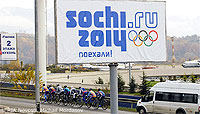Sochi Scorecard: Lots of Progress, But Lots to Be Done

(Moscow Times – themoscowtimes.com – Irina Filatova – February 7, 2013)
[Chart here http://www.themoscowtimes.com/news/article/sochi-scorecard-lots-of-progress-but-lots-to-be-done/475172.html]
An inflatable 8-meter brown bear floating off into the Moscow sunset followed by applause from the stands during the closing ceremony of the 1980 Summer Olympics is perhaps one of the most colorful moments in the country’s sports history.
It took Russia 30 years to win the right to host the high-profile event again, with the one-year countdown to the 2014 Sochi Winter Olympics beginning Thursday.
After winning the Olympic bid in 2007, the country’s authorities started a massive upgrade of infrastructure in the Black Sea resort 1,680 kilometers south of Moscow, which is getting new roads and railroads, luxury hotels and state-of-the art stadiums.
But unlike in the Soviet era, when hosting the Olympics was universally perceived as a matter of national pride, some Russians don’t appreciate the government’s efforts.
Despite official promises that preparations for the games will make Sochi a better place to live, locals say they are tired of living on a big construction site, as the resort town has frequently been referred to over the last few years.
“Construction work is everywhere, all the roads and pavement are dug up, there’s mud and trash all around,” said Alexander Bugayov, a worker at the Sochi meat factory. The locals spend hours in traffic jams every day, he added.
Some were harsher in their judgment.
“Most of us don’t really care about these Olympics, and most won’t go watch the games, especially if they hike prices,” said Andrei Gavrilov, a real estate agent who lives in Sochi. He also complained about the inconvenience caused by the construction.
Gavrilov said there’s hope the city will benefit from hosting the games, with investment in transportation infrastructure widely expected to improve the traffic situation. But he doubted that the huge expenditures on construction of sports facilities would pay off.
“The local population lived OK even before the Olympics,” he said.
The preparations for the games have taken place amid ongoing disputes and scandals regarding housing that was demolished to make way for Olympics-related construction, while environmentalists warned that cutting forests for road construction could be too high a price to pay for national prestige.
But the financial side of the project has remained in the spotlight, since the rising costs of preparing for the games have provoked discussions about corruption and embezzlement.
Opposition activist Boris Nemtsov mocked officials for various violations during the preparations, citing construction of a new road between Adler and Krasnaya Polyana that cost about 260 billion rubles ($8.6 billion) as the most outrageous example of possible embezzlement.
“This road could have been covered with a 5-millimeter layer of gold or a 5-millimeter layer of black caviar and the price would have been approximately equal,” Nemtsov told RBC television last week.
He added that there was no need to build the road and that a cable car would have been a much cheaper transportation option.
While Olympic construction has entered its final stage, Deputy Prime Minister Dmitry Kozak, who oversees preparations for the games, said at last week’s meeting of the state commission in charge of Olympic preparations that a number of problems, such as hotel completion and energy supply, have yet to be resolved.
But he urged the commission members to ensure that deadlines are met, and he told them to work out a plan for emergency situations.
“The Olympics must start Feb. 7, 2014, at 8 p.m., and not a minute later,” Kozak said.
